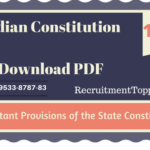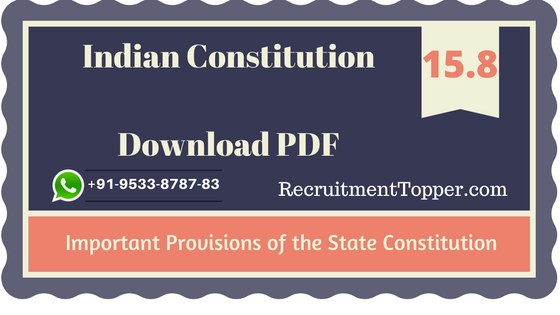Important Provisions of the State Constitution | Indian Constitution
The more important provisions of the State provisions of the Constitution of Jammu & Kashmir are as follows:
The Constitution declares the State of Jammu and Kashmir to be “an integral part of Union of India”.
The territory of the State will comprise all the territories, which, on August 15, 1947, were under the sovereignty or suzerainty of the Ruler of the State (i.e., including the Pakistan-occupied area of Jammu & Kashmir). This provision is immune from amendment.
The executive and legislative power of the State will extend to all matters except those with respect to which Parliament has powers to make laws for the State under the provisions of the Constitution of India.
Every person who is, or is deemed to be, a citizen of India shall be a permanent resident of the State, if on the 14th of May, 1954, he was a State subject of Class I or Class II, or, having lawfully acquired immovable property in the State, he has been ordinarily resident in the State for not less than 10 years prior to that date. Any person who, before the fourteenth day of May, 1954, was a State subject of Class I or of Class II and who, having migrated after the first day of March, 1947, to the territory now included in Pakistan, returns to the State under a permit for resetdement in the State or for permanent return issued by or under the authority of any law made by the State Legislature will on such return be a permanent resident of the State.6 The permanent residents will have all rights guaranteed to them under the Constitution of India [s. 10].
Under the original Constitution of Jammu & Kashmir, there was a difference between this State and other States of India as regards the Head of the State Government. While in the rest of India, the head of the State Executive was called ‘Governor’ and he is appointed by the President [Arts. 152, 155], the Executive head of the State of Jammu & Kashmir was called Sadar-i-Riyasat and he was to be elected by the State Legislative Assembly. This anomaly has, however, been removed by the Constitution of Jammu & Kashmir (6th Amendment) Act, 1965, as a result of which the nomenclature has been changed from Sadar-i-Riyasat to ‘Governor’ and he is to be ‘appointed by the President under his hand and seal’ [ss. 26-27] as in other States [Art. 155]. In the result, there is now no differences on this point, between Jammu & Kashmir and other States. As in other States, the executive power of the State will be vested in the Governor and shall be exercised by him with the advice of the Council of Ministers (except in the matter of appointment of the Chief Minister [s. 36] and of issuing a Proclamation for introducing ‘Governor’s Rule’ in case of breakdown of constitutional machinery Is. 92]). The Governor will hold office for a term of five years. The Council of Ministers, headed by the Chief Minister, will be collectively responsible to the Legislative Assembly.
The Legislature of the State will consist of the Governor and two Houses, to be known respectively as the Legislative Assembly and the Legislative Council. The Legislative Assembly will consist of one hundred members chosen by direct election from territorial constituencies in the State; and two women members nominated by the Governor. Twenty-four seats in the Legislative Assembly will remain vacant to be filled by representatives of people living in Pakistan-occupied areas of the State. The Legislative Council will consist of 36 members. Eleven members will be elected by the members of the Legislative Assembly from amongst persons who are residents of the Province of Kashmir, provided that of the members so elected at least one shall be a resident of Tehsil Ladakh and at least one a resident of Tehsil Kargil, the two outlying areas of the State. Eleven members will be elected by the members of the Legislative Assembly from amongst persons who are residents of the Jammu Province. The remaining 14 members will be elected by various electorates, such as municipal councils, and such other local bodies.
Earlier the High Court of the State consisted of a Chief Justice and two or more other Judges. The High Court has at present a sanctioned strength of 14 Judges including 9 Permanent Judges and 5 Additional Judges. 6A Every Judge of the High Court will be appointed by the President after consultation with the Chief Justice of India and the Governor, and in the case of appointment of ajudge other than the Chief Justice, the Chief Justice of the High Court.
There will be a Public Service Commission for the State. The Commission along with its Chairman will be appointed by the Governor.
Every member of the civil service or one holding a civil post will hold office under the pleasure of the Governor.
The official language of the State will be Urdu, but English will, unless the Legislature by law otherwise provides, continue to be used for all official purposes of the State [s. 145.]
The State Constitution may be amended by introducing a Bill in the Legislative Assembly and getting it passed in each House by a majority of not less than two-thirds of the total membership of that House. But no Bill or amendment seeking to make any change in the provisions relating to the relationship of the State with the Union of India, the extent of executive and legislative powers of the State or the provisions of the Constitution of India as applicable in relation to the State shall be introduced or moved in either House of the Legislature [s. 147]

